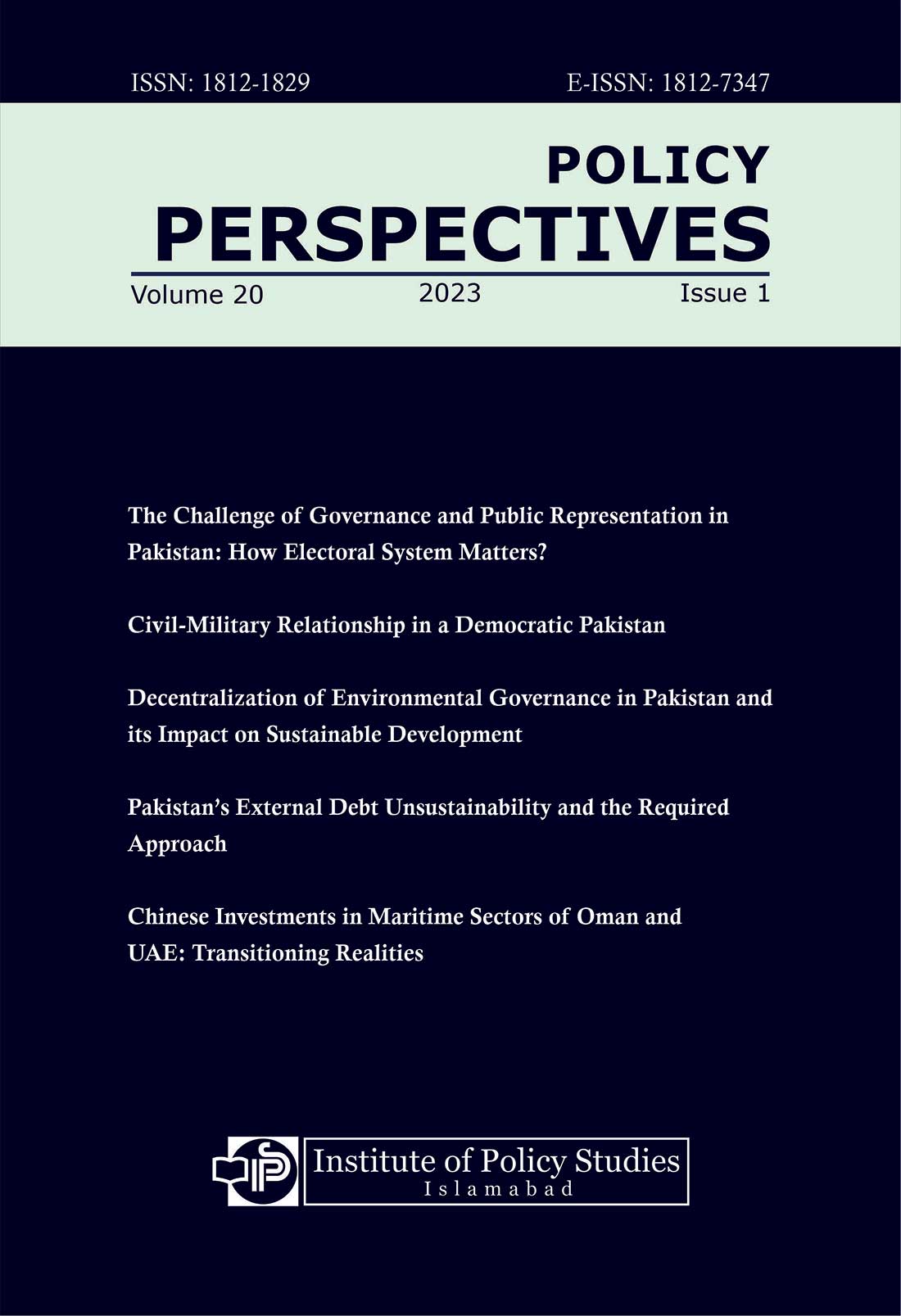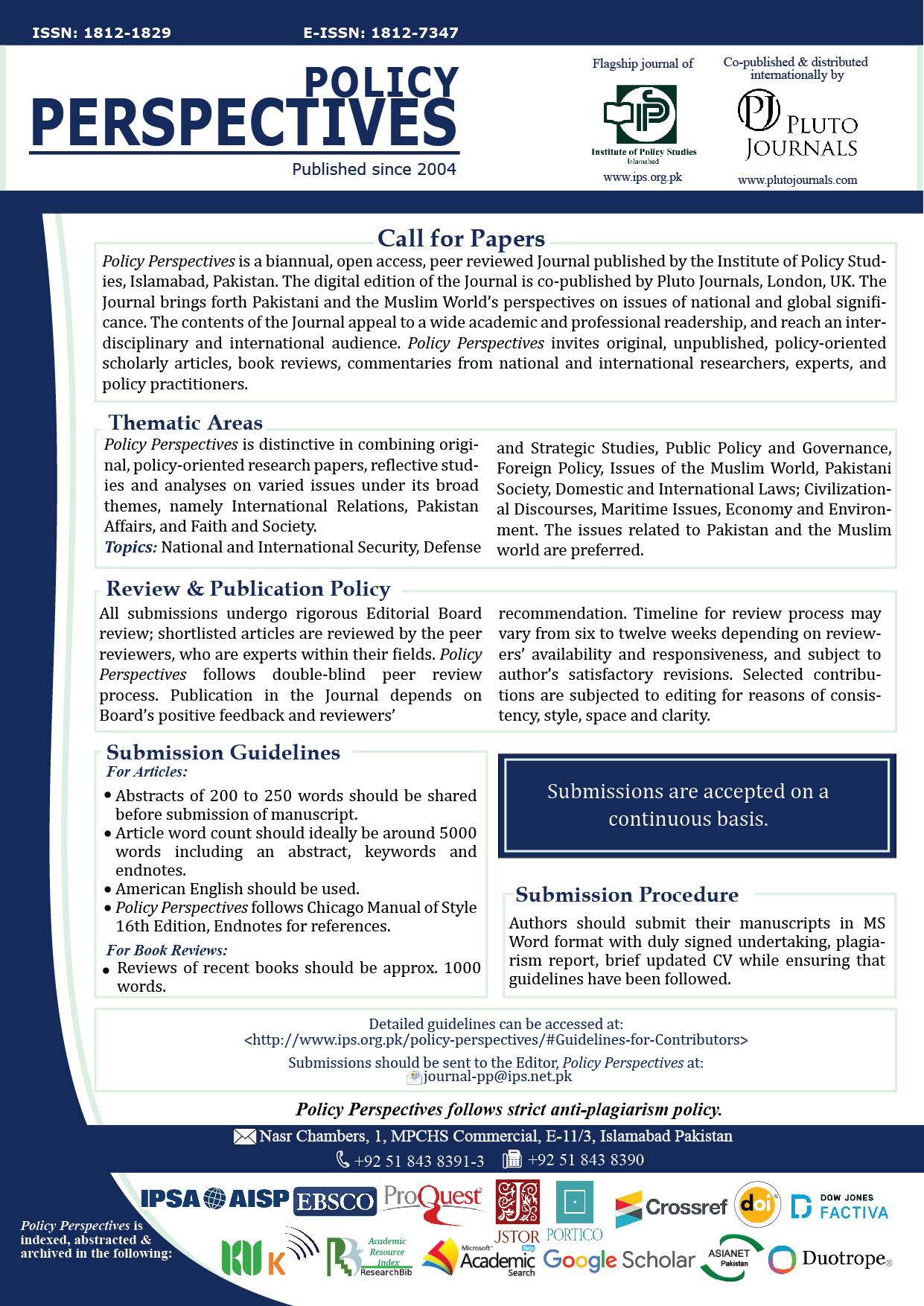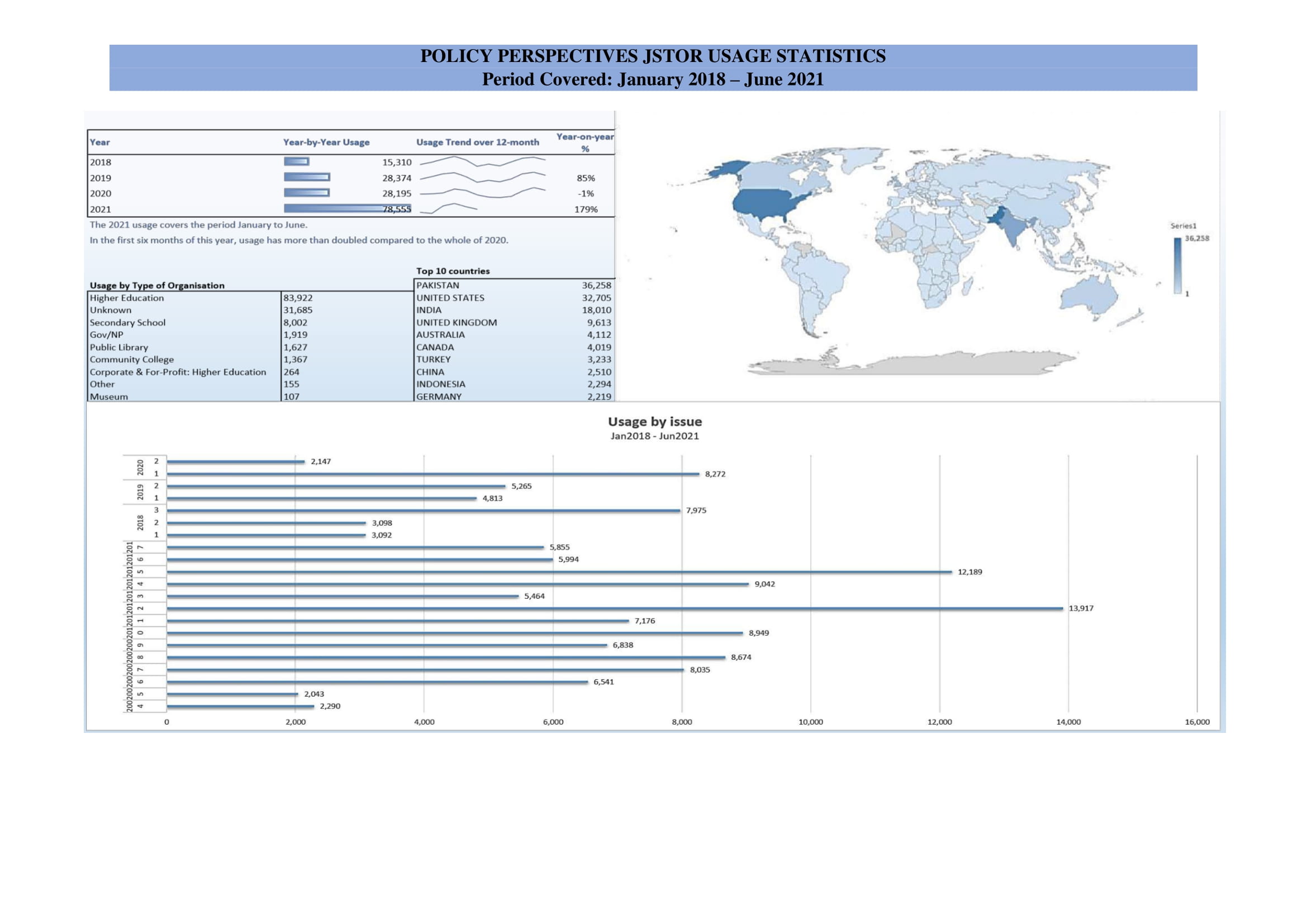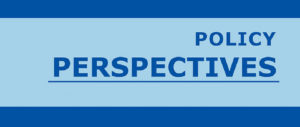ISSN: 1812-1829
E-ISSN: 1812-7347
Policy Perspectives is a peer-reviewed, open access, biannual journal of Institute of Policy Studies (IPS), Islamabad, which also brings forth occasional special issues. The journal disseminates the research carried out by the Institute and its associates on diverse range of current and evolving topics. The digital edition of the Journal is co published and distributed by Pluto Journals, UK.
Policy Perspectives is a peer-reviewed, open access, biannual journal with occasional special issues, published by Institute of Policy Studies (IPS) –an Islamabad-based think tank dedicated to promoting policy-oriented research and human development.
Established in 1979, the Institute defines Pakistan Affairs, International Relations and Faith and Society as its primary research areas, which are further divided into various sub-themes for focused studies.
The Institute’s research spanning over four decades has so far produced over 1500 seminars, conferences and roundtables, around 400 publications, and about 2500 research reports.
Policy Perspectives is the flagship journal of the Institute,disseminating the research carried out by IPS and its associates on diverse range of current and evolving topics. The journal reaches out to a large number of individual and institutional researchers, policy makers, key opinion leaders and other stakeholders within the country and across the globe, extending policy-oriented analysis, perspectives and recommendations on issues of national and global significance.
Policy Perspectives is distinctive in combining original research papers with reflective studies and analysis on varied themes and issues. Contributions to the journal appeal to a wide academic and professional readership, and reach an interdisciplinary and international audience. The Journal welcomes original, unpublished scholarly articles from research scholars, experts and policy practitioners. and accepts contributions in the thematic areas of international relations, Pakistan affairs, and faith and society in general, and the topics related to security, society, economy, strategy, governance and foreign policy in particular.
Editorial Board
Patron: Prof. Khurshid Ahmad Editor-in-Chief: Khalid Rahman Editor: Dr Atiq-uz-Zafar Associate Editors: Naufil Shahrukh, Syed Nadeem Farhat Assistant Editors: Zahida Khalid, Kulsoom Belal Editorial Assistant: Shafaq Sarfaraz
Editorial Advisory Board
Dr Zahid Hussain Bukhari, Executive Director, Center for Islam and Public Policy (CIPP), Washington, DC, USA; Former Director, American Muslim Studies Program (ASMP), Prince Alwaleed Center for Muslim-Christian understanding, Georgetown University, Washington DC, USA. Dr Muhammad Umer Chapra, Advisor, Islamic Research and Training Institute (IRTI), Islamic Development Bank (IDB), Jeddah, Saudi Arabia. Dr Akis Kalaitzidis, Professor, International Relations and Comparative Politics, School of Social Science and Languages, College of Arts Humanities and Social Sciences University of Central Missouri, Warrensburg, USA. Dr Robert Jensen, Professor Emeritus, School of Journalism, Moody College of Communication, University of Texas, Austin, USA. Prof. Roger van Zwanenberg, Managing Director, Pluto Journals, London, UK. Dr Aisha Ahmad , Assistant Professor, Department of Political Science Centre for South Asian Studies, The Asian Institute and Co-Director of the Islam and Global Affairs Initiative at the Munk School of Global Affairs and Public Policy, University of Toronto, Toronto, Canada. Dr Shahram Akbarzadeh, Research Professor, Middle East & Central Asian Politics, Faculty of Arts and Education, Alfred Deakin Institute, Deakin University, Melbourne Burwood Campus, Melbourne, Australia. Dr Torkel Brekke, Professor of History of Religions, Department of Culture Studies and Oriental Languages, University of Oslo, Oslo, Norway. Dr. Wang Xu, Associate Professor, Department of South Asian Studies, School of Foreign Languages, Peking University, Beijing, China. Dr Ivan Safranchuk, Senior Research Fellow, Centre of Central Asia and Afghanistan of the Institute for International Studies, Moscow State Institute of International Relations (MGIMO) University, Moscow, Russia.
Policy Perspectives is indexed/abstracted in the following:
- Directory of Open Access Journals (DOAJ)
- ProQuest
- EBSCO
- Factiva
- Ovid
- ResearchBib
- JSTOR
- Portico
- Crossref
- Google Scholar
- Duotrope
- Journament
- Asianet Pakistan
 |
 |
 |
 |
 |
 |
 |
 |
 |
 |
 |
 |
 |
 |
||
Last updated on 22 March 2023
Call for Papers
Policy Perspectives is a biannual, open access, peer reviewed Journal published by the Institute of Policy Studies, Islamabad, Pakistan. The digital edition of the Journal is co-published by Pluto Journals, London, UK. The Journal brings forth Pakistani and the Muslim World’s perspectives on issues of national and global significance. The contents of the Journal appeal to a wide academic and professional readership, and reach an interdisciplinary and international audience.
Policy Perspectives invites original, unpublished, policy-oriented scholarly articles, book reviews, commentaries from national and international researchers, experts, and policy practitioners.
Thematic Areas
Policy Perspectives is distinctive in combining original, policy-oriented research papers, reflective studies and analyses on varied issues under its broad themes, namely International Relations, Pakistan Affairs, and Faith and Society.
Topics:
National and International Security, Defense and Strategic Studies, Public Policy and Governance, Foreign Policy, Issues of the Muslim World, Pakistani Society, Domestic and International Laws; Civilizational Discourses, Maritime Issues, Economy and Environment. The issues related to Pakistan and the Muslim world are preferred.
Peer Review & Publication Policy
All submissions undergo rigorous Editorial Board review; shortlisted articles are reviewed by the peer reviewers, who are experts within their fields. Policy Perspectives follows double-blind peer review process. Publication in the Journal depends on Board’s positive feedback and reviewers’ recommendation. Timeline for review process may vary from six to twelve weeks depending on reviewers’ availability and responsiveness, and subject to author’s satisfactory revisions. Selected contributions are subjected to editing for reasons of consistency, style, space and clarity.
Submissions are accepted on a continuous basis.
Submission Guidelines
For Articles:
- Abstracts of 200 to 250 words should be shared before submission of manuscript.
- Manuscripts should be in MS Word format.
- Article word count should ideally be around 5000 words including an abstract, key words and endnotes.
- American English should be used.
- Policy Perspectives follows Chicago Manual of Style 16th Edition, Endnotes for references. (For examples, please see detailed guidelines.)
Detailed guidelines can be accessed at:
http://www.ips.org.pk/policy-perspectives/#Guidelines-for-Contributors
For Book Reviews:
- Book Reviews of recent books should be approx. 1000 words.
Submission Procedure:
Authors should submit their manuscripts with duly signed undertaking, plagiarism report, brief updated CV while ensuring that guidelines have been followed at the following address:
Email: journal-pp@ips.net.pk
Postal Address: Nasr Chambers, 1, MPCHS Commercial, E-11/3, Islamabad Pakistan
Tel: +92 51 843 8391-3; +92 51 843 8390

Note: Policy Perspectives follows strict anti-plagiarism policy.
Guidelines for Contributors
The Policy Perspectives welcomes original, unpublished, policy-oriented scholarly manuscripts from research scholars, experts and policy practitioners based in Pakistan and other parts of the world. The journal reaches out to a large number of individual and institutional researchers, policymakers, key opinion leaders and other stakeholders within the country and across the globe, extending policy-oriented analysis, perspectives and recommendations on issues of national and global significance.
Submissions should be made using our digital submission system while ensuring that guidelines have been followed. All submissions are screened by the Editorial Board review; shortlisted articles undergo double-blind peer reviews. Publication in the Journal depends on Board’s positive feedback and reviewers’ recommendation.
Submission Process
To submit a manuscript for consideration for publication in the Policy Perspectives click on the “Submit a Manuscript” button on ScienceOpen in the header of the journal landing page. For details, please see guidelines for online submissions.
Word Count: Abstract should be of no more than 150 words, with 5-6 keywords. Total word count of the article should be ideally around 5000 words.
Book Reviews of latest books of around 1000 words can also be submitted.
Submission Timeline
- Upon submitting an article, author/s will receive an acknowledgement of its receipt. After plagiarism check, the article will be evaluated by the Editorial Board for its suitability for the Journal. If selected, it will be sent to two subject experts for double-blind peer review. This process will take three to four months approximately. Timelines of review process may vary depending on reviewer’s availability and responsiveness.
- Reviewers may suggest major or minor revisions, or reject the manuscript for publication. After Editorial Board has made a decision based on reviewers’ recommendations, author/s will be informed.
- In case of major or minor revisions, reviewers’ feedback will be shared with authors. Authors will be required to incorporate the feedback in two to three weeks for reviewer/s to take a second look.
- While resubmitting, author/s should include the revised article in Track Mode along with their responses for the reviewer/s stating how their comments have been incorporated.
- Upon receiving the revised draft, it will be shared with reviewers to see if they are satisfied with the revisions. Due to reviewers’ busy schedule, this process may take one to two months. Final decision will be communicated to author/s.
- If the manuscript has been approved for publication, it will be included in the next issue. Since Policy Perspectives occasionally publishes special issues, approved article may not be published in the earliest issue. Nonetheless, the author/s will be informed and updated at each stage. Although the editorial team aims to expedite the whole process, it can still take up to a year or less between the original submission deadline and final publication.
Spelling and Style Guide
Spellings and punctuation should be used where they are optional in American English (e.g. organize, center, defense). Commas and periods should be given inside closing quotation marks. Single quotation marks are to be used throughout. Longer quotations should be indented and set off from the text, and given in smaller font size, without quotation marks.
Dates should be written as May 20, 2020. Abbreviations should be given in brackets after giving the full form on first use, e.g., United Nations (UN). Subsequently, UN should be used throughout the text.
References
Chicago Manual of Style (CMOS) 16th Edition should be followed for endnotes. Main words in the titles of articles, books and journals should begin with capital letters. Titles of Books, Journals, Newspapers should be italicized. Reports should be cited like books. In case of multiple authors, give the names of all the authors in the endnotes. Examples of citations in CMOS16 are given below:
Books: Syed Irtiqa Ahmed Zaidi, Negotiating the Power Corridors: Forty Challenging Years of Civil Service (Islamabad: IPS Press, 2020).
Chapters in books: Ye Hailin, “Rise of Extremism in India and Chinese Response,” Hindutva: Rising Extremism in India, ed. Khalid Rahman, 2nd ed. (Islamabad: IPS Press, 2020), 117.
Journal articles: Asma Sana Bilal and Nabiya Imran, “Emerging Contours of Transatlantic Relationship under Trump Administration,” Policy Perspectives 16, no. 1 (2019): 3-21 (7) https://doi.org/10.13169/polipers.16.1.0003.
Newspaper articles/websites: Waqar Masood Khan, “Unified Economic Response,” Express Tribune, April 1, 2020, accessed May 12, 2020, https://www.thenews.com.pk/print/637477-.
Diagrams and Tables
Tables, charts, graphs, and figures may be included in the manuscript where necessary with consecutive numbering, proper captions and complete references. These should be in an editable form. Images should be submitted in high resolution (300-600 dpi) in .jpeg and .bitmap. Responsibility to seek permission to reproduce illustrations subject to copyright lies with the author/s.
Copyright
This journal is published under the Creative Commons License CC BY 4.0. This license allows users, scholars and readers, to read the content or any part of the content without charges. This license allows scholars to download and use the contents for educational purposes. This license does not allow the content or any part of the content to be used for commercial purposes.
Submission/Publication Charges
There is no submission fee or publication charges.
“Is the European Union Evolving or Failing?”
Brief Summary Najimdeen Bakare and Tatheer Zahra Sherazi Volume 16, Issue no. 2, Policy Perspectives (2019): 5-25. https://doi.org/10.13169/polipers.16.2.0005 Abstract In recent years, the European Union (EU) has seen and grappled with a varied degree of crisis, which a few observers considered as proof of its vulnerability and at worst scenario – existential threat. As it is with every crisis, there are gainers and losers; there are those who benefit from the fallout and others who manage to turn vulnerability into opportunity and strength. The crisis surrounding the EU can be characterized along the latter context, particularly in the backdrop of rising European populism. The rise of contemporary European populism has raised many questions and generated debates. Based on its anti-EU rhetoric and growing public acceptability, populism is interpreted as EU’s political nemesis. In the midst of rising European populism, the paper looks at the debates in which the EU is considered as a failing or failed project. It also explores the extent to which European populism impacts the European political landscape. The paper explores the notion of populism as an anti-EU movement, bent at dislodging and disintegrating the Union. It argues that the actions of the populist parties suggest otherwise; populist dramatization underscores EU’s continuous evolution and transition instead of its disintegration. Keywords Populism, EU in Transition, EU’s Demise, EU Legitimacy, EU-Exit, Brexit.
“Citizenship Laws of Pakistan: A Critical Review”
Brief Summary Syed Nadeem Farhat Volume 16, Issue no. 2, Policy Perspectives (2019): 59-85 https://doi.org/10.13169/polipers.16.2.0059 Abstract Citizenship is considered a fundamental right that guarantees every other right. Citizenship law of Pakistan was enacted in 1951 and took care of the situations that could presumably arise with respect to this right. The changes in geography, technology and demography as well as the evolution of international law on citizenship during almost seven decades have created certain gaps that may have implications for individuals and their rights might be at stake. Varying interpretations of the courts on certain dimensions of law as well as the failure to introduce the modifications suggested by superior judiciary are among the factors that cause concerns. Along with the Citizenship Act and the law for naturalization, the treatment of foreigners in the country too has certain serious shortcomings that may have severe implications. This paper focuses more on the statutes and their current interpretation. It underscores the significance of the right to citizenship and analyzes various scenarios for acquisition of citizenship, its loss, the status of foreigners and judgements under Pakistani citizenship laws. Keywords Citizenship, Nationality, Migration, Jus Soli, Irregular Immigration.
“Fatwa Institution and Product Development for Islamic Finance in Pakistan”
Brief Summary Ghazala Ghalib Khan and Atiq-uz-Zafar Volume 16, Issue no. 2, Policy Perspectives (2019): 107-126. https://doi.org/10.13169/polipers.16.2.0107 Abstract Pakistan, being an Islamic Republic, is constitutionally obliged to eliminate ribā (interest) from its economy. Thus, Islamic Finance (IF) industry was introduced as an alternate to conventional ribā-based system of financial intermediation. However, efforts towards innovative system of IF are not devoid of criticism. Thus, institutions offering IF, are denounced for excessive reliance on stratagems to legalize ribā, misuse of plurality in Islamic legal rules and gross misapplication of the principles of Islamic Law. The pivotal task of determining sharīʻah compatibility of products and services is realized through the institution of fatwa. Hence, the given scenario of industry stipulates critical appraisal of role and protocols of this very institution for product development (PD). This article argues that for consistency of Islamic financial intermediation with sharīʻah, the industry needs to standardize ‘product development procedures’ with greater focus on regulating its fatwa institution. Keywords Fatwa, Islamic Finance, Product Development, Sharīʻah, Ribā.
|
Download Contents |
Policy Perspectives (Volume 20, Issue 1, 2023)
The latest issue of Policy Perspectives presents research, analyses and reviews on various topics concerning national, and international issues from policy experts, academics, and practitioners.
The article ‘The Challenge of Governance and Public Representation: How Electoral System Matters?’ discusses the governance challenge and how it is exacerbating serious political and economic crises in the country. It recommends reforming the electoral system to achieve good governance and overcome political and economic challenges, among others. The paper contends that a more representative, multi-tier system of governance can resolve such problems more efficiently and effectively with genuine public participation.
Authors: Khalid Rahman, Chairman, Institute of Policy Studies (IPS), Islamabad.
https://doi.org/10.13169/polipers.20.1.ra1
Dr Khan and Dr Jaffari in their article ‘Civil-Military Relationship in a Democratic Pakistan’ explore the futuristic calibration of Pakistan’s constitutional development and its interpretation through precedents in the face of multiple sociopolitical, socioeconomic, and legal challenges. In particular, they analyze the essential normative characteristics of a constitutional legal framework based on separation of powers between pillars of the state vis-à-vis civil-military relationship.
Authors: Muhammad Yunas Khan, PhD, Center for International Peace and Stability (CIPS), National University of Science & Technology (NUST), Islamabad; and Mubashar H.Jaffari, PhD, Peace and Conflict Studies, Center for International Peace and Stability (CIPS), National University of Science & Technology (NUST), Islamabad, Pakistan; Educationist.
https://doi.org/10.13169/polipers.20.1.ra2
Dr Akbar in his article ‘Decentralization of Environmental Governance in Pakistan and its Impact on Sustainable Development’ evaluates the post-18th Amendment scenario regarding achievement of sustainable environment through better environmental governance in Pakistan. While Pakistan has made progress in devising legislations and laws to manage major environmental issues, it is still not as close to its target of achieving sustainable development despite several decades of efforts at environmental regulation and governance, he argues.
Author: Khalid Farooq Akbar, PhD; Environmental Expert, Punjab Human Development Project by World Bank.
https://doi.org/10.13169/polipers.20.1.ra3
The article ‘Pakistan’s External Debt Unsustainability and the Required Approach’ discusses financial and non-financial variables that prompt external debt distress in Pakistan. It explicates that the economic vulnerability emanates from macroeconomic imbalances and structural problems. It proffers formulating a publicly available blueprint i.e. theory of change to resolve Pakistan’s increased reliance on transnational lenders, including IMF.
Author: Muhammad Sikandar Ali Chaudary, PhD scholar, International Relations, University of Sydney, Sydney, Australia.
https://doi.org/10.13169/polipers.20.1.ra4
The article ‘Chinese Investments in Maritime Sectors of Oman and UAE: Transitioning Realities’ reviews Chinese investments in the maritime sectors of Oman and the United Arab Emirates (UAE), focusing on the potential challenges and opportunities that lie ahead. It highlights China’s increasing influence in the Middle East (ME) and Africa, with a focus on the Belt and Road Initiative (BRI) and the development of key ports and infrastructure projects at Duqm and Khalifa ports.
Author: Muhammad Jawad Akhter, Commodore, Maritime Affairs & Public Policy Expert.
https://doi.org/10.13169/polipers.20.1.ra5
The issue also includes two reviews of the recent books: Iskander Mirza: Pakistan’s First Elected President’s Memoirs from Exile reviewed by Adnan Aamir and Economics and Economic Policy – Islamic Perspective reviewed by Dr Salman Ahmed Shaikh. Lastly, the ‘Dialogue at IPS’ section deals with important themes from some topical discussions held at the Institute of Policy Studies during recent months.
The full text of the articles is available at ScienceOpen and JSTOR.
Annual Subscription PKR1000 Price (Per Issue) PKR600. Overseas USD120 including bank charges. To subscribe, contact: Saeed Gohar Subscription Manager publications@ips.net.pk +(92)-51-8438388
Editorial Office: journal-pp@ips.net.pk




